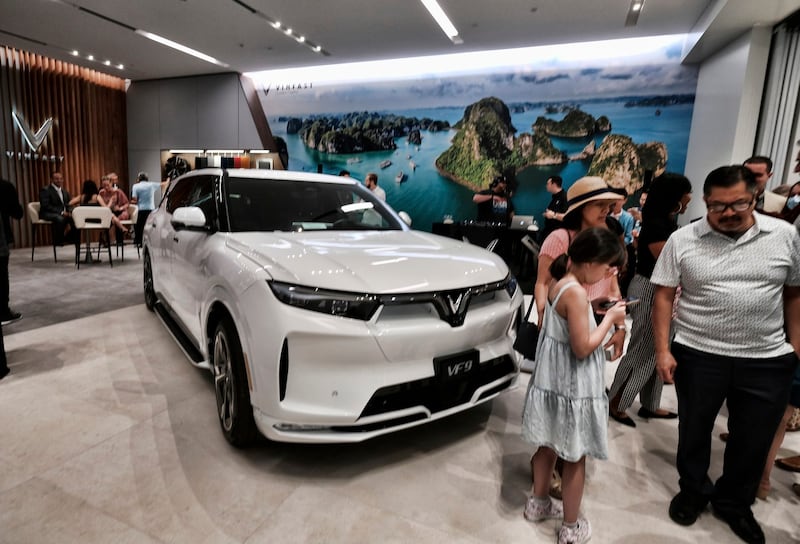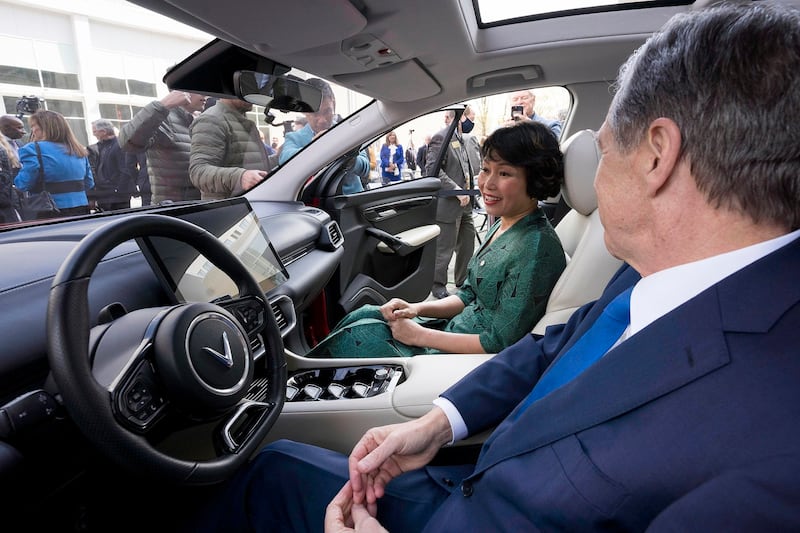For the second day since a debut on the Nasdaq saw its value eclipse that of General Motors and Ford, shares of Vietnamese electric vehicle maker VinFast suffered heavy losses, and experts say it’s too early to guess the company’s long-term worth.
VinFast is the latest auto startup to garner attention from investors keen to back the next Tesla, following listings by Rivian Automotive, Lucid, Fisker and Lordstown Motors in recent years. Despite attracting billions in investment at the outset, their valuations have fallen back to earth amid production delays and other problems.
Investors appeared willing to bet that Vietnam’s first company to list on an American stock exchange could succeed where others had failed, following its merger with special-purpose acquisition company, or SPAC, Black Spade Acquisition that landed VinFast US$30 million in proceeds.
On Tuesday, VinFast stocks soared 250% to trade at US$37 with a market capitalization of US$85 billion, making it the highest valued electric vehicle maker on Wall Street, after Tesla and China’s BYD.
Pham Nhat Vuong, the chairman of VinFast’s parent company Vingroup, controls 99% of VinFast and the company’s first day of trading made him one of the top 30 wealthiest people in the world, according to Forbes’ Real-time Billionaires list.
But shares fell 16% in early trading on Thursday following a 19% drop a day earlier as realities took hold about tough targets Vuong has set for the young company that has struggled to turn a profit since starting production in 2021. VinFast is expected to sell 50,000 electric vehicles this year – more than double the number sold so far – despite signs that sales have begun to slow.

Nguyen Huy Vu, a Norway-based economist, told RFA Vietnamese that Tuesday’s market performance does not reflect the real value of VinFast’s stock or its market capitalization in the United States.
“If you want to know how the market evaluates a company’s value, you should look into the number of its stocks traded daily,” said Vu, noting that only 7 million VinFast shares, or 0.3% of the 2.41 billion issued, that changed hands on its debut. “It’s still too early to say how the market will evaluate VinFast’s capitalization.”
By comparison, around 133 million Tesla shares, or just over 4% of its stock issuance, are traded daily.
Potential volatility
Additionally, Vu said, VinFast restricts trading of its shares by banning short sales and options trading, which are common practices in the U.S. market. The absence of derivative securities services has kept large investment funds out of the game so far.
Observers have also noted that most transactions of VinFast shares on Tuesday were made by existing shareholders.
Investors in blank-check firms have the option to withdraw their money if they don’t want to hold shares in a company once it goes public, and 84% of those in Black Spade did so ahead of the merger, resulting in fewer shares available for trading and the potential for volatile price swings.

David Whiston, an auto-industry analyst at Morningstar, told the Wall Street Journal that VinFast’s stock performance on Tuesday was part of an “EV SPAC bubble” that refuses to pop.
“It makes no sense to me that it’d be worth something approaching BMW and more than GM and Ford,” he said.
VinFast opened its first showrooms in California last year and plans to spend US$2 billion to build an EV factory in North Carolina, where production could begin in 2025.
The company, which was established in 2017, began delivering its all-electric SUV, the VF8, to the U.S. from its factory in Vietnam in March and is taking orders for another SUV, the VF9. Since beginning production in 2021, VinFast has delivered nearly 19,000 vehicles through the end of June, mostly within Vietnam.
Translated by Anna Vu. Edited by Joshua Lipes.
